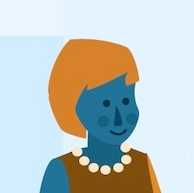Kelly Powell
I loved moving to Brussels. But after a while I felt homesick. On InterNations I met a bunch of people from the US. That helped a lot.
Maria Lombardi
You can really get lost in the "capital of Europe" - InterNations helped me to get settled and to make a lot of expat friends.
Life in Belgium
At a Glance:
- Belgium does not have a homogenous national identity, as the country is divided between the Dutch and French language and culture.
- Education is compulsory between six and 18. The education system is decentralized, making the enrollment process diverse and competitive. There is a big offering of international schools.
- The Belgian healthcare system covers up to 75% of medical expenses and there is no need to see a general practitioner in the first instance.
- There are multiple ways to find housing; among the most popular are newspapers, newsletters, and expatriate organizations.
Why are so many expats living in Belgium? The answer to that question is relatively simple. Most foreigners are based in Brussels, which is not only one of the EU “capitals”, but also hosts the NATO headquarters. Almost 15% of all 11.2 million of Belgium’s current inhabitants were not born there — about 12.5% of the people living in Belgium are foreigners! International diplomats, politicians, and civil servants working for one of the many intergovernmental organizations in Brussels make up a significant share of these foreign residents.
High Population Density and Air Pollution
Belgium is a highly urbanized country: an estimated 97% of all people in Belgium reside in towns or cities. With over 370 people per km², the whole country has a very high population density.
In some respects, the Belgian government has failed to adequately respond to the challenge presented by such figures, leaving Belgium’s residents to suffer from the environmental impacts. In the 2016 Environmental Performance Index, the country was ranked 41st, which puts it between Cyprus and Costa Rica and far behind other European countries.
In general though, foreigners don’t face any adverse circumstances. The country’s poor environmental record rarely has an immediate effect upon everyday life. There are no extreme weather conditions: Belgium enjoys a temperate climate with mild winters and cool summers. Rain, humidity, and clouds are featured rather prominently in the daily weather forecast.
A Culture without Compromise
When it comes to Belgian culture, it is safe to claim that the country does not have a homogenous national identity. To be sure, generally speaking the culture refers to all the aspects that are shared by all the Belgians regardless of their spoken language. However, each area has its own characteristics and the culture seems to be closely related to the language spoken there.
For instance, the Flemish-speaking community is closer to the English-speaking culture and the Dutch one, whereas French speakers seem to draw more from the French customs and their way of living. For this reason many Belgians perceive themselves above all as Europeans and feel very close to the European culture. This might be partially also influenced by the presence of European institutions in the capital.
This fragmented culture influences the Belgian political system as well; as a foreigner you might be surprised by its complexity, but you should know that even locals struggle to understand it. In short, there are three decision-making authorities: the federal government, the three language communities (Flemish, French, and German), and the three regions (Flanders, Wallonia, and Brussels-Capital). Each region has its own government and its own responsibilities. This very friction between Flanders and Wallonia, or between the French- and the Flemish-speaking groups, forms the basis of the current political divisions, as each group wants more decision-making power. At the heart of the issue there is the reluctance to reach a compromise.


Advertisement
Education in Belgium
The Well-Organized Belgian School System
Preschool education starts at the age of 2½ in Belgium; it is not compulsory, and no formal lessons take place there. However, 98% of Belgian children are enrolled in formal childcare or preschool. Parents can enroll their children at a preschool of their choice, although they are not always guaranteed a place.
Education is compulsory between the ages of six and 18 and it starts with primary school. In fact, you must enroll your children at a school within 60 days of your registration in Belgium. Primary school consists of six years of basic education in reading, writing, and mathematics. Classes are held in the community language; learning a second language begins during the next-to-last year of primary education for most children.
With regards to language classes, an exception is made for students in the Brussels-Capital Region, who start learning the second official language, i.e. French or Dutch, in their third year of primary school. Some primary schools also offer language immersion classes, i.e. certain subjects such as history or geography are taught in a second language.
Secondary education starts at the age of twelve. It is divided into four branches: humanities, technical, artistic, and vocational. Apart from the latter, all these branches prepare students for university. The technical and artistic branches differ from the general humanities branch insofar as they offer students the possibility to specialize earlier on in their academic career. The vocational path in secondary education helps students qualify for a particular occupation.
A Fair but Competitive School Enrollment System
Schools in Belgium don’t have a strict zoning system. While this allows parents and children to choose their school freely, it also means that a school often cannot accept all children from a specific neighborhood. If there are more applications than places, some kids may be rejected. If this is the case, the applicant will be referred to the Enrollment Commission for further assistance.
Due to the decentralized educational system, it is difficult to make general statements on the subject of enrollment. School enrollment periods vary according to language community: in the Francophone regions, it is usually a two-week period in March or April; in the Flemish regions, enrollment is possible all year round, but no earlier than the first day of the preceding academic year. Further information and useful links are available on Portal Belgium.
Documents required in order to enroll your child at a Belgian school include: proof of identity, a residence permit (if applicable), proof that all standard vaccinations have been administered, proof of address, and any previous academic records.
An International Country Means International Schools
In a country hosting so many intergovernmental organizations, there are, of course, plenty of international schools catering to the expat community. Most of them are located in and around Brussels, but Antwerp and Mons are also home to a few international schools.
Other private schools are often affiliated with a religion, usually Catholic. If these schools receive public funding, they charge little or no tuition fees, but the state also controls their curriculum. Private schools without state funding obviously have much higher tuition fees. It is advisable to check whether they offer internationally recognized qualifications before you enroll your child.


Advertisement
Healthcare and Housing in Belgium
Belgium’s Excellent Healthcare System
Expats living in Belgium profit from the country’s very good healthcare system. Health insurance in Belgium is part of the Belgian social security system and therefore compulsory for everyone residing in the country.
Since only up to 75% of medical expenses are covered by compulsory health insurance plans, many Belgians and expats alike choose to take out additional private insurance to cover excess payments. The non-refundable share of medical treatment costs is commonly referred to as the patient fee.
Belgium has very good public and private hospitals throughout the country. Every major city has at least one general public hospital. University towns often have more than one specialized healthcare institution.
The website of the Belgian Hospital Association lists all hospitals by region or specialization. Private clinics are not necessarily any better than state hospitals, but they often specialize in certain (surgical) treatments.
How Doctors in Belgium Work
Patients may choose which doctor or specialist to consult, and there is no need to see a general practitioner in the first instance. If you do not speak the local language very well, try contacting the local embassy or consulate of your country for a list of doctors who speak your native tongue. The US Embassy in Brussels should be able to provide you with contact details of English-speaking physicians.
Some doctors divide their time between a hospital and their private practice. Registered doctors may only charge fixed rates for treatments which are on the government’s “nomenclature of medical dispensations”. If you are offered a treatment which is not on that list, you should check with your health insurance fund whether and how much they will contribute.
Your Social Security Identity card, which you will receive from your health insurance fund, should be taken along for every visit to the doctor or to a hospital. You should also get a set of stickers from your insurance fund. One of these stickers should be attached to every doctor’s bill before returning it to your fund for reimbursement.
The Multiple Ways to Find Accommodation
There is generally no shortage of accommodation for rent in Belgium and properties become available all year round. They are usually advertised in daily newspapers and on dedicated internet sites. If your French or Dutch is not really up to par, try the English publication The Bulletin and keep your eyes peeled for orange signs in windows indicating that a property is “for rent” (à louer or te huur).
Of course, in bigger cities like Brussels finding accommodation is more challenging. However, among the expat community the best way to look for housing is by word of mouth, especially if you are looking for a place in an area where you are already living. Looking in local newspapers, magazines, and newsletters published by clubs and expatriate organizations might also be a good idea. In addition, real estate agents (agences immobilières / makelaars in onroerende goederen or simply makelaars) could also provide help in your search.
Most flats are rented unfurnished and a security deposit of up to three month’s rent may be required. If you are expected to pay a deposit, make sure that an inventory is taken recording the condition of the property before you move in. Also note that every tenant is obliged by law to take out a comprehensive household insurance policy.
Advertisement
Why you'll love InterNations in Belgium
and countless possibilities for fun and friendship!
Advertisement
Advertisement
Advertisement
Our Global Partners
Advertisement
Communities in Belgium
Like-Minded Expatriates in Belgium
Belgium Guide Topics
Advertisement




